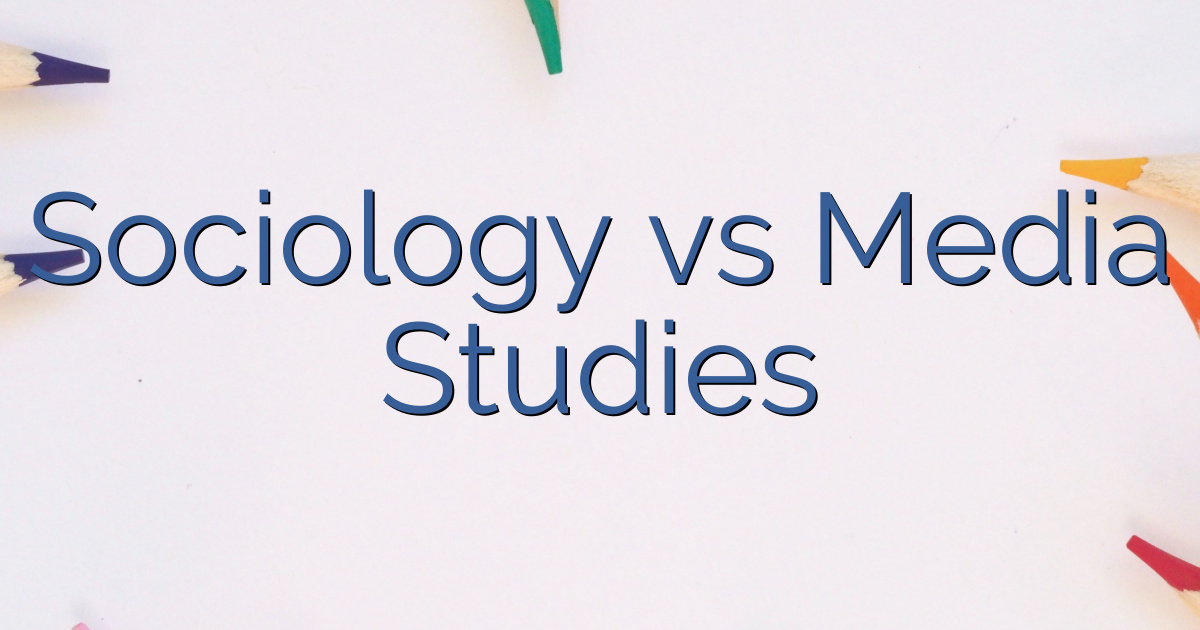 Are you torn between majoring in Sociology or Media Studies? Well, buckle up because we’re about to dive into the ultimate showdown: Sociology Vs. Media Studies.
Get ready to explore the ins and outs of these two fascinating fields of study. From the curriculum to the career opportunities, we’ll break it all down for you.
So, grab a cup of coffee and prepare to make an informed decision that will shape your academic and professional future.
Let the battle begin!
Are you torn between majoring in Sociology or Media Studies? Well, buckle up because we’re about to dive into the ultimate showdown: Sociology Vs. Media Studies.
Get ready to explore the ins and outs of these two fascinating fields of study. From the curriculum to the career opportunities, we’ll break it all down for you.
So, grab a cup of coffee and prepare to make an informed decision that will shape your academic and professional future.
Let the battle begin!
Table of Contents
Key Takeaways – Sociology vs Media Studies
- Sociology and Media Studies both analyze the intersection of social structures and media, highlighting power, representation, and identity in society and media.
- The curriculum for Sociology includes core courses in social theory, research methods, and statistics, while Media Studies focuses on media history, media theory, and media production.
- Assessment and evaluation methods in Sociology involve exams, essays, and presentations, while Media Studies includes practical assignments, essays, and presentations that evaluate media production skills and critical analysis.
- Both majors develop critical thinking abilities, research skills, media analysis skills, interdisciplinary thinking, and transferable skills such as media literacy, communication, and critical analysis of media content, enhancing career prospects in various industries.
Overview of the two majors: Sociology and Media Studies
Sociology and Media Studies are two majors that offer unique perspectives on understanding society and the role of media. When it comes to curriculum differences, Sociology focuses on the study of human society, social relationships, and social institutions. It critically examines social issues such as inequality, race, gender, and class. On the other hand, Media Studies concentrates on the analysis of media technologies, communication processes, and the impact of media on society. It explores topics like media production, media effects, and media representation. In terms of job prospects, Sociology graduates can pursue careers in various fields such as social work, human resources, research, or community development. Media Studies graduates, on the other hand, have opportunities in media production, journalism, advertising, public relations, or digital media. Both majors provide students with interdisciplinary skills that are highly valued in today’s society. It is important to consider your interests and career goals when choosing between these two majors, as they offer distinct yet complementary perspectives on understanding society and the media.Overview of the curriculum of the two majors: Sociology and Media Studies and coursework
The curriculum for the two majors includes a variety of coursework options. In sociology, core courses cover topics such as social theory, research methods, and statistics. Electives allow students to explore specialized areas like gender studies, race relations, or criminology. Specializations in sociology can be pursued in areas like social inequality, globalization, or urban studies. On the other hand, media studies core courses focus on media history, media theory, and media production. Electives offer opportunities to delve into specific topics like film studies, journalism, or digital media. Specializations in media studies can be pursued in areas such as advertising, public relations, or media ethics. Both majors emphasize the importance of internships and practical experience, as they provide students with real-world skills and industry connections.| Sociology | Media Studies | |
|---|---|---|
| Core Courses | Social Theory, Research Methods, Statistics | Media History, Media Theory, Media Production |
| Electives | Gender Studies, Race Relations, Criminology | Film Studies, Journalism, Digital Media |
| Specializations | Social Inequality, Globalization, Urban Studies | Advertising, Public Relations, Media Ethics |
| Internships | Emphasized as valuable for real-world skills | Emphasized as valuable for industry connections |
Overview of coursework, assessments, and evaluation methods
When it comes to evaluating your coursework in both majors, you can expect a mix of assessments including exams, essays, presentations, and projects. Coursework assessment in sociology and media studies is designed to test your understanding of key concepts, theories, and methodologies in these fields. In sociology, you will be evaluated on your ability to analyze social phenomena, conduct research, and critically engage with sociological theories. Evaluation methods in sociology may include written exams that assess your knowledge of sociological concepts, essays that require you to apply sociological theories to real-world issues, and presentations that allow you to present your research findings. In media studies, you will be assessed on your understanding of media theories, media production skills, and critical analysis of media texts. Evaluation methods in media studies may include practical assignments such as video production projects, written essays that analyze media texts, and presentations that demonstrate your understanding of media theories. Overall, the coursework assessment in both majors aims to develop your analytical and critical thinking skills while also allowing you to apply your knowledge to real-world situations.Comparison of Transferable Skills Developed
As a student in both sociology and media studies, you can develop transferable skills that will greatly enhance your career prospects. Through these majors, you will acquire critical thinking abilities, enabling you to analyze and evaluate complex social and media issues. Your research skills will also be honed, allowing you to gather and interpret data effectively. Media analysis will be another key skill, as you will learn to critically examine various forms of media and understand their impact on society. Furthermore, both sociology and media studies promote interdisciplinary thinking, encouraging you to draw connections between different fields of study.Comparison of Career Opportunities and Job Roles in Sociology and Media Studies
By combining sociology and media studies, you can explore a wide range of career opportunities and job roles. Both fields offer unique perspectives on society and its relationship with media. In terms of job prospects, sociology provides a solid foundation for careers in social research, policy analysis, and advocacy. With an understanding of social structures and processes, sociologists can contribute to shaping public opinion and informing social change. On the other hand, media studies opens up avenues in journalism, broadcasting, marketing, and public relations. The industry trends show a growing demand for professionals who can navigate the ever-changing media landscape and understand its impact on society. Whether you choose sociology or media studies, both fields offer exciting possibilities for those interested in understanding and shaping the world we live in.Comparison of Salary Potential in Sociology and Media Studies Careers
Combining sociology and media studies can lead to different salary potentials in careers within these fields. When considering the salary potential of a career in sociology, there are several factors to take into account:- Specialization: Certain areas of sociology, such as criminology or social work, may offer higher salary prospects due to the demand for professionals in these fields.
- Level of Education: Obtaining a higher degree, such as a master’s or Ph.D., can significantly impact salary potential in sociology, as advanced education demonstrates expertise and can open doors to higher-paying positions.
- Industry and Location: The salary potential in sociology can vary depending on the industry and location. For example, working in the private sector or in metropolitan areas may offer higher salaries compared to non-profit organizations or rural areas.
- Experience and Reputation: Building a strong portfolio and gaining experience in the media industry can lead to higher salary prospects. Established professionals with a reputable track record may command higher pay rates.
- Media Platform: Working in different media platforms, such as television, film, or digital media, can impact salary potential. Certain platforms may offer higher salaries due to their popularity and revenue generation.
- Job Role: The specific job role within media studies can also influence salary potential. For example, positions such as director, producer, or senior journalist often come with higher salaries compared to entry-level roles.
Similarities between Sociology and Media Studies curricula
When considering your academic path, it’s important to note the similarities between the curricula of sociology and media studies. Both fields share a strong emphasis on the theoretical foundations that underpin their respective disciplines. In sociology, students are exposed to theories such as functionalism, conflict theory, and symbolic interactionism. These theories help them understand social phenomena and analyze societal structures. Similarly, media studies also draw on various theoretical frameworks, such as cultural studies, political economy, and semiotics. These frameworks are used to critically examine the role and impact of media in society. Both disciplines also explore the ways in which social structures and media intersect. They focus on issues of power, representation, and identity. By studying these shared theoretical foundations, students in both sociology and media studies gain a comprehensive understanding of the complex relationship between society and media.Difference between Sociology and Media Studies curricula
In terms of coursework, sociology and media studies differ in the focus of their curricula. While both majors explore social phenomena and human behavior, they approach these subjects from different angles. Here is an overview of the two majors and a comparison of the transferable skills developed:- Sociology:
- Focuses on studying society, social interactions, and social institutions.
- Emphasizes critical thinking, research methods, and data analysis.
- Develops skills in understanding social inequality, culture, and social change.
- Media Studies:
- Focuses on the study of media, communication, and its impact on society.
- Emphasizes media analysis, media production, and understanding media effects.
- Develops skills in media literacy, communication, and critical analysis of media content.
How Does the Study of Crime and Deviance Differ from Media Studies in Sociology?
The sociology and crime comparison focuses on the social causes and effects of criminal behavior, while media studies in sociology examine how representations of crime in media shape societal perceptions. Sociology delves into the root causes of deviance, while media studies analyze the portrayal and impact of crime in media.

